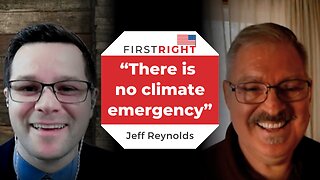Rachel Bovard, Senior Tech Columnist with The Federalist
Doug talks to Rachel Bovard, senior tech columnist with The Federalist
(Machine Transcribed)
Doug Truax: Welcome to the First Right podcast, a weekly conservative new show brought to you by Restoration PAC. I'm Doug Truax, founder, and president of Restoration PAC. Today, we were blessed to have first-time guests and one of the most important young conservative voices in Washington, Rachel Bovard, Rachel is so influential that the fake conservative columnist from the New York times, David Brooks labeled her and other young conservatives as terrifying in a recent column. All right, Rachel, thanks so much for coming on.
Rachel Bovard: My pleasure. Thanks for having me.
Doug Truax: All right. So, so the David Brooks thing, even though he did say, I think he said you were charming and funny and things like that, he labeled you as terrifying. And so what's been the, what was your reaction to that? And what's kinda been the reaction around DC in, in your circles with that, regarding that, that article he wrote.
Rachel Bovard: Well, I didn't see it for a while. I'm not a regular reader of the Atlantic, so I'm, I missed it when it came out. I got a few texts about it. I think Brooks made the sort of mortal sin of a hit piece, which is giving the subject, you're trying to mock too much airtime because it, I think it didn't make me sound that scary, to be honest. And most of the people I talked to were like, no, you, you know, I think he was trying to paint me as some sort of terror in a skirt and it didn't quite, I think it, I think it backfired slightly.
Doug Truax: Right? Absolutely. Well, that's it? Yeah. It's always good to just kind of ridicule them back a little bit. Like, like what you're doing there. I think that's, that's wonderful. So, well, Hey, so you've got, I love, I love your posts. You're where you're at with the culture and, and the, and the party and everything. I think you're dead on in so many ways. We've been talking about cultural issues a lot around here lately. So what do you think conservatives are kind of doing right right now and what are we doing wrong when it comes to the culture?
Rachel Bovard: Well, you know, I think a lot of conservatives are doing the right thing in pointing out that the culture matters because I think for a long time, the sort of emphasis of DCS, right leaning institutions anyway, were sort of to lean out of the culture. The culture is too divisive. You know, we need to focus on economics. If, you know, we just allow the mediating institutions to work. Everything will be fine. And maybe that was true at one time, but you know, the sort of institutions that we've always relied upon in civil society are completely captured by ideologies that we don't agree with. And I think if Trump's presidency showed us anything, it was that leaning into the culture war and standing up for the right of, you know, conservatives to speak, to have their own beliefs, to practice their faith that actually expanded the base.We have more voters in the Republican party because Trump emphasized those issues. He was probably a surprising vehicle for that for a lot of people, but, you know, he did that. He was fearless about it. And so I think keeping that momentum is going to be very important because generally speaking, when Republicans are in the majority, social conservatives are sort of like, nobody wants to talk to them, right? They are useful on the campaign trail. But when we actually get to Washington, nobody actually wants to listen to them or do what they have to say besides like the one pro-life vote a year. So I do think that we have to take conservative social concerns much more seriously. And, and the culture war generally, that is the word that matters. That's the war that's in front of us. And so we have to fight it on all fronts.
Doug Truax: We were heavily involved in the Virginia race too. And you saw it there with Youngkin and that whole crowd, it's just like what you're talking about. People are super concerned about these things that nobody wants to talk about because they get beat down by the left. And then there's a great example of just politically it's in your favor because if a lot of people are concerned about it, you should be talking about it,
Rachel Bovard: Right! No, and this is the thing like the, all the polls show this. And, you know, even, I think Gallup recently had a poll showing that the Republican party has the highest amount of identification in like decades. And it is because the left has gone so insane on the culture that it is actually driving people to the Republican party. And I think the mistake would be however, for the Republicans to think that it's because, you know, they've earned this support. No, they haven't. The left has just made it so unpalatable to be a leftist that they're coming to us for solutions. So if we don't provide them anything in the way of solutions, in the way of fearlessness, in the way of actually addressing the concerns that are affecting people day to day, this is not some like far off threat. This is at your child's school. This is at your church. You know, this is in your community. If people aren't the Republicans aren't willing to engage in those fights the way Glen Youngkin really leaned into it in Virginia, then we are going to lose all those voters that the leftist just sent to us.
Doug Truax: Yeah, absolutely. And I think they're going to continue sending them to us. I think it was a Victor Davis Hanson, I think, was talking about this one time. The fatal flaw with the left is that they have no limit. They'll keep going and going. That's the interesting thing about the spectrum of things on the right. We have, well, there's a place in here where even, you know, culture warriors, they'll be like, no, let's not go that far on this certain thing, but the left, they just go off into space, you know? And it's, it's an opportunity for us to point it out and to get some people back, but you're right. If we don't step up and say, yeah, we'll actually fight for this. Or if we just use it as a, as a political opportunity, I mean, you see that so often, you know, especially in DC and around conservative politics, like, well, let's just use it to get through the election. You know, that that's not fair. You're just, you're being disingenuous. Then if you just use it to get through the election, and I know you've kind of been calling out Republican establishment too about, Hey guys, let's step this up and talk about some real things that we're going to actually, you know, do after we get elected, not just the same old thing we've been saying for decades in the Republican party.
Rachel Bovard: Right. Yeah. I think you're absolutely right in the sense that, you know, DCS, Republican, institutional elite, they love to use the social conservatives or the cultural war on the campaign trail, but they have no intent of actually addressing it. You kind of saw this with Kevin McCarthy's proposed agenda for house Republican majority in 2022. He's like the closest he got to the culture war was talking about a parent's bill of rights. Well, what does that even mean? And is it actually enforceable? Are you talking about putting something into law? Cause okay. Then I'm at the table, right? You've caught my interest, but if you're talking about like a resolution non-binding on anyone simply saying that parents matter, you got to do more than that. Right now. You gotta, you gotta give us better in this moment.
Doug Truax: That's right. That's right. I always think, is it, is this just marketing to raise money and get some votes? Or is this something you really believe in and you're going to do so. Yeah. Well, so you, you write a lot about tech issues too. And so, you know, big tech and censoring conservatives. So, so in your opinion, having watched all this and to where we are at this point, what do you think is the best thing we could be doing next as conservatives to fight back?
Rachel Bovard: So we have, I think at this point we have to legislate this, you know, a lot of us don't, didn't start at that point in the beginning of this debate, because we've always relied on these sorts of things that the conservative movement has always relied upon. Like if we build our own platform, you know, if we build alternatives, if we try to boycott these platforms, they'll get the message and they'll reform. But what I don't think we accounted for was just how ubiquitous these platforms are in controlling our daily lives. Like there is no way to get off Google if you live in the modern world, every app on your smartphone runs on Google. You know, Google is, you know, tracking you across the web. Even if you're not using Google search, we didn't account for these things. And in many ways that's sort of the classic story of innovation and America in many ways is that, you know, we have a lot of innovation.
That's what we built our economy to account for it. We love it. But at some point when that innovation reaches a tipping point, when it starts to actually change the nature of our social discourse, to put parameters around what we can and cannot say, to change how we interact with each other, how we vote, how we search for information, then that's the time where we usually take that innovation and we incorporate it into our values and traditions into our legal framework instead of simply allowing it to shape us. And I think we are, that is where we are in this debate. I think what happened to Parler was so instructive on how, you know, our alternatives will not be allowed to succeed because the point isn't to have alternatives, the left wants to control everything that we do wherever we're speaking.
Doug Truax: Yeah, totally agree. Big tech is way too big. And it's like you said, it's a big ubiq- ubiquitous it's, everywhere. And we gotta make sure we fight back as much as we can. But so I have one, I had Emily Jashinsky on the show. We had the same topic about it is kind of like, well, it's so big, where do you go to get news now? There's, you know, you have the mainstream media is just, you know the normal news organizations are just crumbling as an institution. It's just horrible. So what, what do you see out there, where are you going to get your news? What, when your peers are asking you, you know, what do you do and where should I be going to, to figure out what's really going on? What do you tell them?
Rachel Bovard: Well, Emily and I both write for the Federalist, which I think is a great, is a
Doug Truax: Great,
Rachel Bovard: Yeah, not the Federalist, but, you know, I think a lot of my peers anyway, which I think is very encouraging are turning off cable news, and they're starting to go to, again, sort of that those niche outlets, the Federalist, the blue, you know, blaze media, daily caller, but also beginning to follow, you know, individual reporters that they trust on platforms like substack, you know, going to YouTube channels if they're not, you know, banned and Rumble, if they are, you know, I think people are beginning to seek out trust that they've lost in the normal outlets. You know, because I think COVID has, I think unmasked sort of the establishment journalism for being in many cases, just an arm of, of the managerial elite. It's a propaganda machine on so many fronts, and it's not actually providing that sort of critical inquiry and feedback that that's what we expect from reporters. And we expect from news, but there are individuals who are doing it that I think my peers learned to trust. They trust their reporting. They think they're honest. And so they're following those people wherever they go. You know, this is sort of the Joe Rogan effect in many ways. You know, why people listen to Joe Rogan because they think he's an honest broker. And so I think that trust that used to be in institutions is now actually transferring to individuals. And so that's a really interesting dynamic, I think, in the media landscape,
Doug Truax: It's like, who can you trust? And I think like what you're saying, if you trust the channel, then you never know what they're going to put on there. And it is, it does go back to, they're trying to make, you know, make money through the advertising and get, just get you to stay and push and fear and come back. We'll give you some more fear and you'll, you know, you'll, you'll keep paying us, watching the advertising. And so on that, you know, you mentioned the COVID thing and, you know, we're, I feel like what's happened here just like in the last couple of days is we've kind of got to that point now. It's like, all right, let's start re-evaluating what happened over the last couple of years. And the Johns Hopkins stuff is out now. And, and, you know, I have my opinions about how things have happened, especially for the younger generation. I was surprised too, at how compliant the lot of them got right out of the gate. And so maybe we could start there with the COVID piece, which were you surprised in, in your generation, how, you know, it used to be, Hey rebellion is good, but now it's like, oh, tell us what to do and we'll go and do it. It was, I was just surprised by the whole thing.
Rachel Bovard: Yeah. I was surprised as well. Although, you know, it's an interesting generational question because I'm on the elder side of the millennials, they call us the geriatric millennials and we came of age, right. With 9/11. So I was a senior in high school in 9/ 1, and that sort of shaped our generation into a very, you know, sort of patriotic country first in many ways, I wouldn't say that that has carried over to like the younger millennials or the gen Zs, but for my generation, that's how it was. And so we weren't necessarily predisposed, I think, to be like our government's definitely lying to us here, even though, you know, you had the specter of the Iraq war, which I think galvanized many of us, you know, with a public health crisis, your first instinct is to be like, well, you know, let me, let me take this seriously for a little bit, at least.
But then I think it became abundantly clear, you know, for many of us anyway, like what was actually happening, which is that we completely lost our minds. That coherent risk analysis was just not possible for these people anymore. Right. But you know, on the flip side of it, I think you do see some younger people that, you know, this sort of panic porn or, or this like living in fear and inflicting that fear on others, that's been their whole lives. That explains the sort of fragility, you know, ethos that you see in a lot of universities, in many cases, the elite institutions groomed. I think that generation to be the COVID tyrants, that they are to be enforcing their feelings and their, you know, opinions informed or not on everyone else and calling it violence when people don't agree. And that is a very dangerous way to live in society, right? When you have a ruling class that has that attitude. And unfortunately, I think that's where we are and who you're even seeing oddly enough, like the old hippies join in. You've seen it from like Neil young and, you know, Howard Stern of all people, you know, they, kind of grew up to become the man and that is distressing
Doug Truax: And it's that attitude about, well, the government says it, we're all going to be in this together and we're all going to do it. And if we just do the together thing, we'll all get by it. And you know, if you're not participating, you're going down then. And I just, I've been shocked about the whole thing. It's just been really, it's really been sad to watch. I, I feel like we've just had this generational piece now where, you know, if you're just going to, if you're just going to go any, anything against the orthodoxy, then you know, we're going to, we're going to beat you down. And I just, it's, it's a, it's a bad place to be. And so...
Rachel Bovard: I think, because it's not even, we're going to beat you down, we're going to expel you from polite society. It's not even like weird, you know, odd. It's like, you can't live with us. It's, it's very, discriminatory
Doug Truax: And you talk about how people grew up and with government and things. I, had the thought for a long time that, well, we have this cool thing called the center for disease control. It's like a whole federal agency, and they're really smart in there and they're going to figure it out. And you know, when we got into this pandemic, I'm like, well, let's, the CDC is going to come out with something. It'll be, you know, this is exactly what the data's telling us. This is what you should do. But man, it's just turned into a disaster and like thousands and thousands of people working over there, what are they doing? You know, it's like what happened in this, in this scenario?
Rachel Bovard: Yeah. The, one of the most stunning revelations from the pandemic has been the incompetence of our public health infrastructure. And I think the they've leaned into that and competence, which, which I think has bred such distrust of public health officials that I think that's going to linger for at least a generation, maybe more. And I, and I have, I think somewhat dire consequences for public health in America, because they've just been so incompetent and never admitted fault or humility or, you know, anything in that situation because that's how you restore trust, right? You say, oh, we got it wrong. You know, now, you know, we don't crack down on speech. We disagree with, we try to answer it. Those kinds of things. We haven't seen any of that behavior from our institutions. And that, like I said, that's going to be one of the lingering effects of COVID is, is the distrust of those institutions.
Doug Truax: Yeah. They were incompetent coming into it. And nobody really quite knew how bad that was. And then it got on full display. And then like you said, they wouldn't humble themselves at all and say, well, maybe we got this wrong. We need to go this direction. It's just the continual doubling down. And now we've got the situation with the inflation is rampant because the dumping of the money. And I mean, we just like, it's going to keep, that's another show. We'll talk about the economy and some other show, but, but Hey, I just appreciate all that you do with your you're very courageous in your writing and saying the things that need to be said and really grateful that you came on the show and I'd love to have you back sometime.
Rachel Bovard: Thanks so much for having me. I'd love to come back.
Doug Truax: All right. That's our show for today. Thank you so much for tuning in and for supporting conservative media. Don't ever forget that by working together and staying diligent, we can serve as can bring our country back to true greatness until next week. Let's all keep praying that God will continue to bless America
First right A new kind of new summary without the liberal slant every morning in your inbox, always free subscribe by texting FIRSTRIGHT 3 0 1 6 1 that's FIRSTRIGHT All caps. One word to 3, 0 1 6, 1.
-
 22:22
22:22
Restoration of America
2 months agoYou May Not Be Interested in “Climate Change,” But the Cultists Are Interested In You
3.61K3 -
 1:00:32
1:00:32
The StoneZONE with Roger Stone
5 hours agoTrump’s NYC Lynching — The StoneZONE w/ Roger Stone + Derrick Evans and Jim Pfaff
15.9K12 -
 LIVE
LIVE
Tommy's Podcast
3 hours agoE442: Ground Branch
967 watching -
 2:26:21
2:26:21
WeAreChange
4 hours agoIt's NOT JUST The Covid Vax That's The Problem...
36K21 -
 2:23:36
2:23:36
Robert Gouveia
4 hours agoTrump Trial Day 6: Bragg Demands $100k Penalty; Pecker BACK; Biden BUSTED in Florida
53.1K28 -
 1:57:29
1:57:29
Matt Kim
9 hours agoFree Speech Around the World is at RISK | live with Rumble CEO Chris Pavlovski
36.9K44 -
 1:41:53
1:41:53
The Quartering
12 hours agoTuesday's Breaking News! College Campus WARS, Trump Trial Updates & More
71.5K32 -
 1:20:09
1:20:09
Redacted News
6 hours agoPutin issues WARNING to Biden "We will destroy all of them" | Redacted with Clayton Morris
123K389 -
 1:19:14
1:19:14
Awaken With JP
11 hours agoSociety is Crumbling LOL - LIES Ep. 37
98.9K117 -
 1:00:00
1:00:00
The Osbournes Podcast
8 hours agoOzzy Hates This Episode | 911 Emergency
51K19